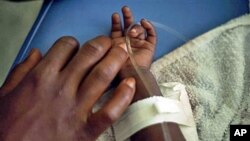The U.N. humanitarian coordinator in Haiti says the number of cholera cases is expected to rise sharply as more data is collected, but the organization is working with the government to help contain the number of cases and the fatalities from it.
U.N. Humanitarian Coordinator in Haiti Nigel Fisher says cholera cases have been found in every Haiti province, known as departments, as well as the capital Port-au-Prince.
He said the United Nations is trying to collect more data to include information from communities to get a more realistic picture of the outbreak.
"We expect to have, once that data comes in, a significant increase in recorded cases. So people should not be surprised at that," said Fisher.
Speaking to reporters in New York during a teleconference from Haiti, Fisher said emphasis is continuing on educating the public about the disease and making sure they have access to oral rehydration salts and tablets to chlorinate their water.
Fisher said plans are also being made to increase the number of cholera treatment centers across the country.
"It is [cholera] spreading and we have to contain, if not [the] number of cases, we have to try to contain the number of deaths," he said.
He also noted that the disease is spreading faster in slums, such as Cite Soleil, than in camps for people displaced by last January's devastating earthquake. Fisher said the camps have latrines and access to clean water the slums lack.
Last week, the United Nations appealed for nearly $164 million for cholera relief in Haiti during the next six months. Since the outbreak was confirmed on October 22, more than 11,000 cases have been cited and more than 900 people have died from the disease, which is spread through contaminated food and water.
UN Expects Haiti Cholera Cases to Rise




